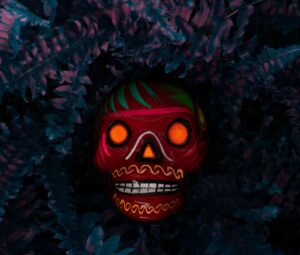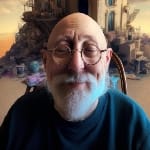PART II: MUST IT BE HORROR?

Image used for representation
This month I needed an easy cheat, so I beg your forgiveness as I set aside all pretensions of professional academic rigor and use this second installment of the Wyrd Words column to contemplate the exhilarating sense of awe engendered by the Horror Genre and the larger field of Speculative Fiction. Yes, I said “awe.”
Allow me to start with a confession: I have almost lost the ability to be frightened by imaginative works of the Horror Genre. Far more frightening for me is the reality we live in, a global nightmare of nations at war, mass shootings, pandemics, environmental collapse, unemployment, and fascist politicians with mass appeal. These are scary days.
But in the literary and cinematic spaces where dwells the masterworks of Science Fiction, Fantasy, and Horror, there we may find gods at play. And for me, these divine beings born of the human imagination have the wings of demons. Don’t let that frighten you.
Rather than “fear,” I usually experience “awe” when I come across the best works of Speculative Fiction. That’s especially true for Horror. This may seem unusual because the general assumption about the Horror Genre is that these texts — print and video alike — are designed solely to “scare” people. In fairness, that expectation is built into the name “horror,” a word that originates from Latin and French roots that describe hair standing on end and nerves so frayed they cause a trembling of the body.
But those shuddering symptoms can also accompany the coming into contact with a power so incredible it appears otherworldly or celestial, as when you witness a lightning bolt wrapping itself around a nearby tree. You will be terrified, of course, because lightning can kill. But the lightning is also wondrous and awesome, a natural power of seemingly divine origin.
The word “awe” suggests an extreme emotional experience that somehow opens us up psychologically to larger understandings of the surrounding reality and our place within it. This expansion of awareness can drift toward both the negative and the positive, potentially bringing us the awful as well as the awesome. Either way, the individual comes away from such an experience with an expanded consciousness, a greater awareness of not only the world around us, but of ourselves as well. “Everybody has a secret world inside of them,” Neil Gaiman famously wrote. “Not just one world. Hundreds of them. Thousands maybe.”
This “expanded awareness” of ourselves is something I value quite highly when I experience it through the best works of Speculative Fiction, and especially the finest that the Horror Genre can offer. These texts can provide brutal insights into the human condition and open windows that allow us to see our own potential for corruption. But these same imaginative works are also more likely to inspire us, especially through the portrayal of hope and kindness in protagonists who acknowledge the darkness and wish to resist it.
Admittedly, all great works of Art are solid commentaries on the universals we experience as living human animals, such as knowing love, discovering purpose, grieving loss, or transitioning from strength to infirmity. This pondering of the human condition has been at the heart of our species’ addiction to storytelling for as long as we have had language. Proof of this is found in the wondrous narratives that weave their way through literary classics such as Gilgamesh, The Mahabharata, The Iliad and the Odyssey, Beowulf, The Romance of the Three Kingdoms, or The Tale of Genji, to name but a few “older” examples gleaned from our diverse global cultures.
But from among all that Art can offer in every format, the Horror Genre is best equipped to fully portray both the depths and the heights of the human experience and human potential. No other genre can so completely, unabashedly, or heartbreakingly interrogate the question of what it means to be human, perhaps because the genre carries within itself the expectation that good times are always temporary. But so too are bad times.
Even the most nihilistic of contemporary narratives cannot completely darken our craving for hope, as two of the genre’s most influential films suggest. George Romero’s Night of the Living Dead troubles us by having the sole survivor mistakenly targeted by the rescuing posse. William Friedkin’s The Exorcist disappoints us when the most “rational” of priests is overcome by the very same “superstition” he struggled against as a scholar. Hope persists despite the disappointment of watching our favorite protagonists come to nasty ends, for we must acknowledge that the zombie hordes are being culled and the dark angels are being expelled.
Horror achieves its ability to dwell within the extremes of the human condition because its purview is all-encompassing. Of course, the finest non-genre works of literature and cinema may portray with great complexity the complementary and contradictory aspects of the human character. My favorite example is Atticus Finch as encompassed by Harper Lee’s To Kill a Mockingbird and Go Set a Watchman. The Atticus Finch who strives to protect the right of all citizens to a fair trial is also at heart a racist. Like all of us, he carries within himself the potential for goodness and wickedness. Across these two books he displays what Carl Jung says is the shadow aspect that we all hold within ourselves: “Every good quality has its bad side, and nothing that is good can come into the world without directly producing a corresponding evil” (229).
Is it wrong to assume that the primary driver of every artistic expression is the human psyche? After all, it is through our conscious minds that we as biological animals engage with our surrounding physical surroundings, undertake social interactions with others of our species, and make decisions that affect everything and everyone.
If all creative endeavors are in some way simultaneously expressions and examinations of human consciousness — of our self-awareness — then how much more breathtaking are the works of Speculative Fiction, and especially Horror? As I previously noted, these narratives are more willing to acknowledge the human as a creature capable of both greatness and atrociousness. We are angels and demons.
Allow me to step deeper into this contemplation of the human psyche by asking us to think about the external influences that shape the internal conversations we call self, mind, or consciousness. I suggest that our mental narratives about ourselves are formed from the inputs we receive from “external” sources. The most influential of these is the body that encases the brain where consciousness seems to dwell.
That statement about the importance of the meat sack we call our bodies might seem naïve to a professional philosopher, but for the creator and consumer of Art it may come across as slightly uncomfortable. Even the middle grade school student knows that stories are all about relationships between people and how a narrative’s main protagonist is buffeted about by the opinions and actions of other people. Literature is all about the human as a social animal, even those that choose to shipwreck their protagonists on strange shores where Lilliputians battle Blefuscudians, or cannibals commute in canoes while they search for their next meal. In the majority of fictional texts across the print and visual media, the “consciousness” of fictional figures is forged from interactions with other minds carried within their own biological bodies.
But many of the most interesting works within the Horror Genre are comfortable looking “elsewhere” when considering the factors that contribute to the makeup of the human psyche with its mess of emotions and rationalities. That “elsewhere” is often the brain’s personal meat sack, its own body. Unlike traditional literary narratives, the Horror Genre is incredibly comfortable with the idea that the biological body itself is the primary influencer of a protagonist’s psychic formation or state of being.
The Horror Genre is never afraid of the suggestion that bodily transformation can be a conduit to altered states of consciousness. The finest illustration might be Franz Kafka’s Gregor Samsa, a young man who was never as psychically satisfied with his place in the world as when he became a man-sized beetle. Another famous example comes from David Cronenberg’s film The Fly, in which scientist Seth Brundle’s gradual transformation into “Brundlefly” completely alters his consciousness, as his heightened sensual arousal leads directly to a decline in the drive for social interaction — empathy — that all primates have. In contrast to Cronenberg’s emotionally de-evolved protagonist is the obsessed scientist at the heart of Ken Russell’s film Altered States, a work in which the bodily transformation experience leads the protagonist toward an expanded appreciation of the human as a social animal.
These three examples of Horror from within the world of Speculative Fiction are built upon the assumption that the human psyche is an intricate extension of the animal body, an argument that few texts outside of this category may willingly make. And with that I pull the strings that will close the purse that is this second contribution to the Wyrd Words column, and promise next time to drop another coin of contemplation about the relevance of the Horror Genre and its appreciation for the bodily meat sack as the site of subjectivity. I will of course be poking about the idea of “body horror,” and hopefully I can appropriately alchemize — or “translate,” if you will — what many think of as the simplest and fatuous aspects of the Horror Genre into the diamond crystals of psycho-social complexity.
Gaiman, Neil. The Sandman. Vol. 5: A Game of You. New York: DC Comics, 2011. Print.
Jung, Carl. Man in Search of a Soul. Trans. W.F. Dell and Cary F. Baynes. London: Kegan Paul, Trench, Trubner & Co., 1933.
Also read, Wyrd Words: Personal reflection on the Art of Horror (Part I) written by Grandfather Hu and published in The Antonym.
Wyrd Words: Personal Reflection on the Art of Horror (Part I)— Grandfather Hu
Follow The Antonym’s Facebook page and Instagram account for more content and exciting updates.


























0 Comments